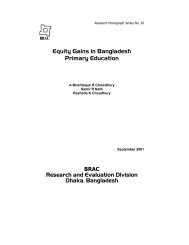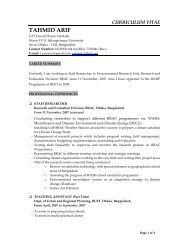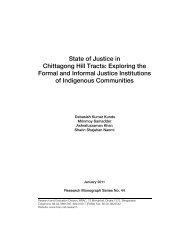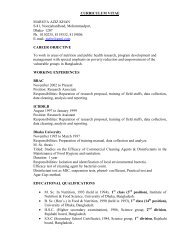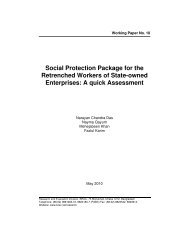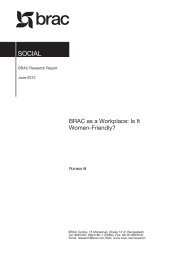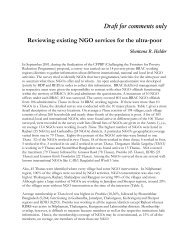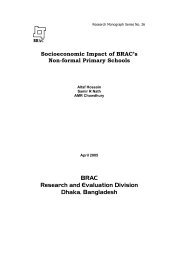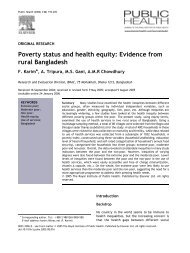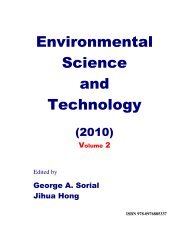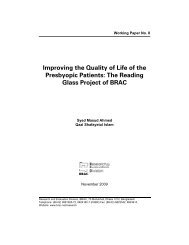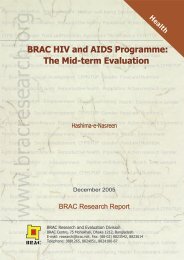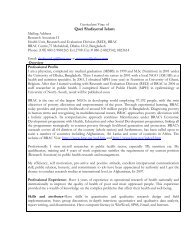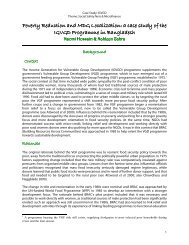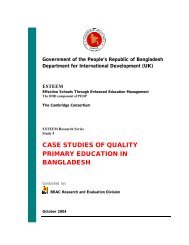Combining health and social protection measures to reach the ultra ...
Combining health and social protection measures to reach the ultra ...
Combining health and social protection measures to reach the ultra ...
Create successful ePaper yourself
Turn your PDF publications into a flip-book with our unique Google optimized e-Paper software.
Innovation<br />
some of this risk might be <strong>to</strong> match private sec<strong>to</strong>r venture<br />
capital investments in vaccine R&D for certain diseases with<br />
public sec<strong>to</strong>r funds or <strong>to</strong> provide grants <strong>to</strong> venture capital<br />
firms that fill a certain fraction of <strong>the</strong>ir portfolio with<br />
investments in <strong>the</strong>se areas.<br />
These ideas merit fur<strong>the</strong>r investigation, although it is not<br />
clear from initial consultations with venture fund managers<br />
that subsidies of this kind would substantially change <strong>the</strong><br />
risk/reward calculations of potential inves<strong>to</strong>rs. Moreover,<br />
venture capitalists were skeptical of <strong>the</strong> idea of a venture<br />
fund that blended AIDS/TB/malaria vaccine projects with<br />
o<strong>the</strong>r biotech activities 15 . This is because venture inves<strong>to</strong>rs<br />
would prefer that all projects in a fund be evaluated relative<br />
<strong>to</strong> <strong>the</strong> same objectives (i.e., financial returns or contribution<br />
<strong>to</strong> a <strong>social</strong> goal), ra<strong>the</strong>r than by different <strong>and</strong> potentially<br />
incompatible criteria.<br />
If successful, venture capital subsidy or matching schemes<br />
would have <strong>the</strong> potential <strong>to</strong> bring private sec<strong>to</strong>r capital as<br />
well as private sec<strong>to</strong>r project evaluation <strong>and</strong> management<br />
expertise <strong>to</strong> early-stage vaccine R&D.<br />
Conclusions<br />
Global <strong>health</strong> has moved <strong>to</strong> centre stage in recent years, as<br />
<strong>health</strong> care is increasingly recognized as a critical part of<br />
efforts <strong>to</strong> reduce poverty <strong>and</strong> improve <strong>the</strong> quality of life of<br />
billions of people, <strong>and</strong> as a powerful way <strong>to</strong> harness science<br />
<strong>and</strong> technology <strong>to</strong> <strong>the</strong> pursuit of <strong>social</strong> goals.<br />
There has been substantial innovation in global <strong>health</strong><br />
financing recently, especially in creating new sources,<br />
intermediaries <strong>and</strong> financial modalities for <strong>the</strong> purchase of<br />
existing drugs <strong>and</strong> vaccines <strong>and</strong> <strong>the</strong> delivery of <strong>health</strong><br />
services. Although <strong>the</strong>re has been less change in <strong>the</strong> funding<br />
of <strong>health</strong> R&D, <strong>the</strong> establishment of PDPs <strong>and</strong> <strong>the</strong> launch of<br />
a vaccine AMC are important developments.<br />
Despite <strong>the</strong>se advances, <strong>the</strong>re are still significant gaps <strong>and</strong><br />
deficiencies in vaccine R&D financing, including insufficient<br />
volume, focus, flexibility <strong>and</strong> predictability. In this paper we<br />
begin <strong>to</strong> develop a framework for characterizing <strong>and</strong><br />
assessing <strong>the</strong> strengths <strong>and</strong> limitations of financing<br />
mechanisms for vaccine R&D <strong>and</strong> propose some new<br />
financing approaches that might address <strong>the</strong> deficiencies that<br />
we have identified. ❏<br />
Robert Hecht is <strong>the</strong> Head of Policy Research <strong>and</strong> Advocacy at<br />
<strong>the</strong> International AIDS Vaccine Initiative. In that capacity, he<br />
oversees a programme of analysis <strong>and</strong> out<strong>reach</strong> that aims <strong>to</strong><br />
accelerate <strong>the</strong> scientific search for an AIDS vaccine <strong>and</strong> ensure<br />
rapid access <strong>to</strong> a vaccine which can help <strong>to</strong> end <strong>the</strong> global<br />
p<strong>and</strong>emic. He joined IAVI in 2004 after a 20-year tenure at <strong>the</strong><br />
World Bank, where his last position was as Direc<strong>to</strong>r <strong>and</strong> Sec<strong>to</strong>r<br />
Manager of <strong>the</strong> Bank’s Central Unit for Health, Nutrition <strong>and</strong><br />
Population, with oversight for global strategies, knowledge,<br />
technical services <strong>and</strong> partnerships. His o<strong>the</strong>r positions at <strong>the</strong><br />
Bank included Chief of Operations for <strong>the</strong> World Bank’s Human<br />
Development Network, Principal Economist in <strong>the</strong> Latin America<br />
region, <strong>and</strong> member of <strong>the</strong> core team <strong>and</strong> a principal author of <strong>the</strong><br />
1993 World Development Report, Investing in Health. From 1987<br />
<strong>to</strong> 1996, Dr Hecht was responsible for a number of World Bank<br />
sponsored studies <strong>and</strong> projects in <strong>health</strong> in Africa <strong>and</strong> Latin<br />
America, most notably in Zimbabwe <strong>and</strong> Argentina.<br />
He also served as an Associate Direc<strong>to</strong>r of <strong>the</strong> Joint United<br />
Nations Programme on HIV/AIDS (UNAIDS) from 1998 <strong>to</strong> 2001,<br />
where he managed technical units based in South Africa, Côte<br />
d'Ivoire <strong>and</strong> Thail<strong>and</strong>, as well as in Geneva.<br />
Dr Hecht is <strong>the</strong> author of more than 30 articles <strong>and</strong> o<strong>the</strong>r<br />
publications. He received his undergraduate degree from Yale <strong>and</strong><br />
his doc<strong>to</strong>rate from Cambridge University.<br />
Paul A Wilson has recently joined <strong>the</strong> International AIDS<br />
Vaccine Initiative (IAVI) as Direc<strong>to</strong>r of Policy Research. He comes<br />
<strong>to</strong> IAVI from Columbia University, where he is an assistant<br />
professor in <strong>the</strong> Mailman School of Public Health. At Columbia Dr<br />
Wilson worked on a range of <strong>to</strong>pics in AIDS policy, including<br />
strategies for meeting <strong>the</strong> Millennium Development Goal on AIDS,<br />
evaluation of programmes for orphans, <strong>and</strong> financing of AIDS<br />
vaccine development. He is <strong>the</strong> lead author of <strong>the</strong> UN Millennium<br />
Project’s report Combating AIDS in <strong>the</strong> Developing World.<br />
Dr Wilson spent much of his career as a scientist. Before<br />
moving <strong>to</strong> Columbia <strong>to</strong> work on global <strong>health</strong> policy, he was an<br />
Assistant Professor of Cell Biology at <strong>the</strong> Cornell Medical College.<br />
Dr Wilson holds a PhD in Zoology from <strong>the</strong> University of California<br />
at Berkeley, an MSc degree in Economics from <strong>the</strong> London School<br />
of Economics <strong>and</strong> an undergraduate degree in Physics from<br />
Prince<strong>to</strong>n University.<br />
092 ✜ Global Forum Update on Research for Health Volume 4



